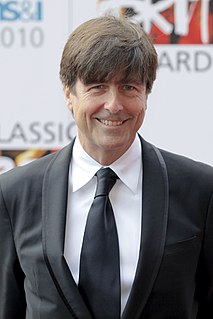Top 56 Quotes & Sayings by Thomas Newman
Explore popular quotes and sayings by an American composer Thomas Newman.
Last updated on April 13, 2025.
You can always hear a director saying, 'Well I don't really know what this piece is saying, so therefore, I reject it.' There are any number of things you can anticipate going wrong, and sometimes they go right. But I think the things you like most are the things that get rejected first. That's just how things work.
Robert Altman was a very jovial guy and obviously a famed improviser and perhaps less effective in post-production, which is like the crystallising process. So I found myself at sea often with him because we'd have conversations about what music is, and in the end, I don't know how interested he was?
My father's Alfred Newman - born in 1900, child prodigy at the piano, ended up in pit orchestras in the teens. I think he's one of the youngest conductors to conduct Broadway and worked with George Gershwin and Jerome Kern and Cole Porter - went out with Irvin Berlin in 1930 to Hollywood and never left.
























